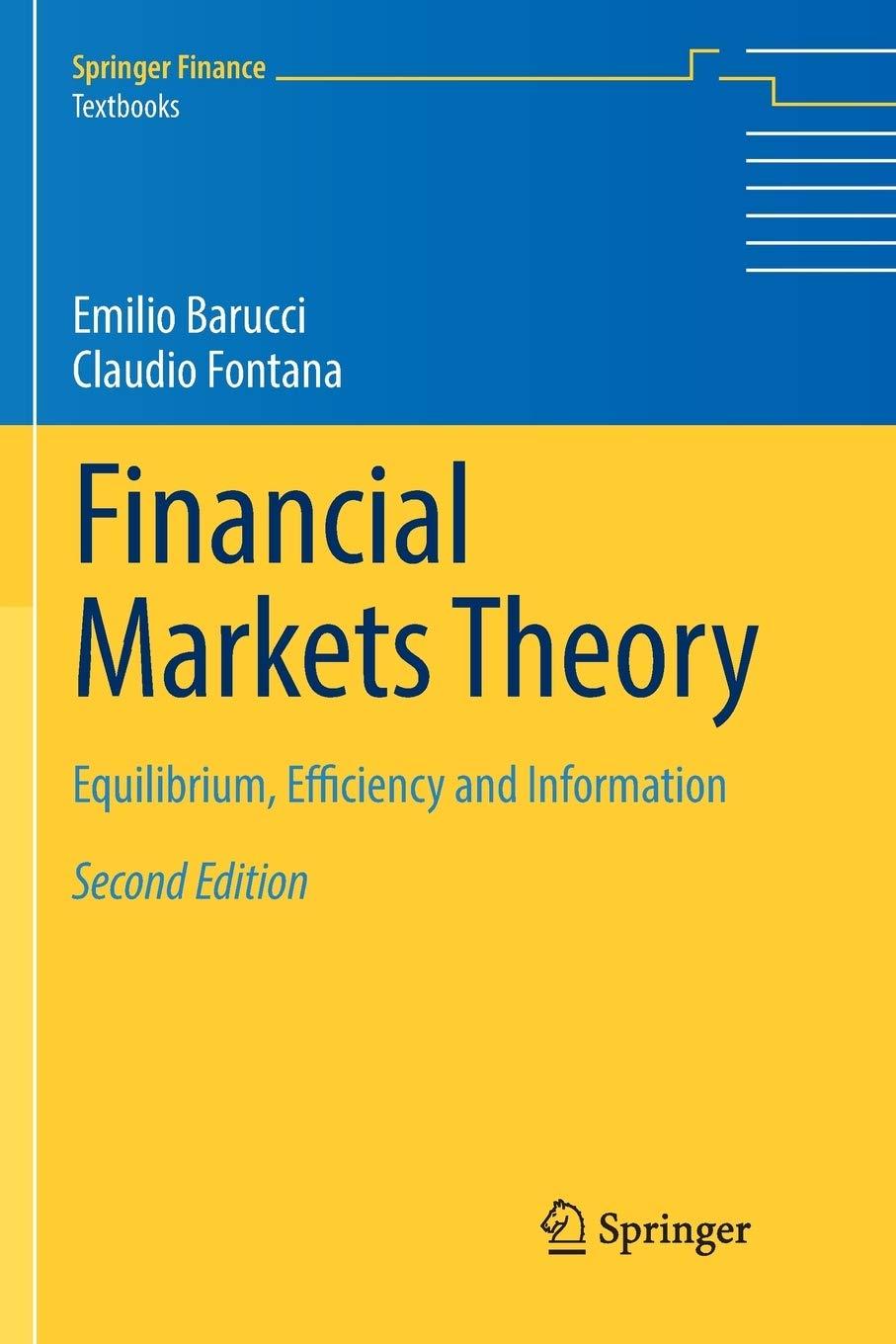Consider the model proposed in Glosten & Milgrom [790] and presented in Sect. 10.3. In this exercise,
Question:
Consider the model proposed in Glosten \& Milgrom [790] and presented in Sect. 10.3. In this exercise, by relying mainly on the tower property of the conditional expectation and following the original arguments of Glosten \& Milgrom [790], we are going to prove Proposition 10.8. Suppose that there exist two processes \(\left(p_{t}^{\text {ask }}\right)_{t=1, \ldots, T_{0}}\) and \(\left(p_{t}^{\text {bid }}\right)_{t=1, \ldots, T_{0}}\) satisfying the equilibrium condition (10.25). We shall prove the inequality stated in Proposition 10.8 for the ask price, the proof of the inequality for the bid price being completely analogous. Let \(t \in\left\{1, \ldots, T_{0}\right\}\) and, for simplicity of notation, define the event \(C_{t}\) by
\[C_{t}:=\left\{Z_{t}>p_{t}^{\text {ask }}\right\}=\left\{\mathbb{E}\left[\tilde{v} \mid \mathscr{K}_{t}\right]>p_{t}^{\text {ask }} / \delta_{t}\right\},\]
where the second equality simply follows by the definition of \(Z_{t}\), using the information flow \(\mathbb{K}=\left(\mathscr{K}_{t}\right)_{t=1, \ldots, T_{0}}\) introduced after (10.23). Note that
\[p_{t}^{\text {ask }}=\mathbb{E}\left[\tilde{v} \mid \mathscr{D}_{t}, C_{t}\right]\]
For brevity of notation, in the remaining part of the exercise, we shall denote by \(\mathbb{E}_{t}[\cdot]\) the conditional expectation \(\mathbb{E}\left[\cdot \mid \mathscr{D}_{t} \wedge \mathscr{F}_{t}\right]\), for \(t=1, \ldots, T_{0}\).
(i) By relying on the tower property of the conditional expectation, prove that
\[p_{t}^{\text {ask }}=\mathbb{E}_{t}\left[\tilde{v} \mid C_{t}\right]\]
(ii) By relying on condition (10.21), show that
\[\mathbb{E}_{t}\left[\tilde{v} \mid C_{t}\right]=\mathbb{E}_{t}\left[\mathbb{E}\left[\mathbb{E}\left[\tilde{v} \mid \mathscr{K}_{t}\right] \mid \mathscr{D}_{t} \wedge \mathscr{F}_{t} \vee \sigma\left(\delta_{t}\right), C_{t}\right] \mid C_{t}\right]\]
(iii) Prove that, for any random variable \(X\) with a finite expectation, it holds that
\[\mathbb{E}[X \mid X>a] \geq \mathbb{E}[X]\]
for any \(a \in \mathbb{R}\). Moreover, argue that the same relationship also holds for a conditional expectation of the form \(\mathbb{E}[X \mid \mathscr{A}, X>a]\), where \(\mathscr{A}\) is an arbitrary \(\sigma\)-algebra.
(iv) By relying on the results established in steps (ii)-(iii) of the exercise, show that
\[\mathbb{E}_{t}\left[\tilde{v} \mid C_{t}\right] \geq \mathbb{E}_{t}\left[\mathbb{E}_{t}\left[\mathbb{E}\left[\tilde{v} \mid \mathscr{K}_{t}\right] \mid \sigma\left(\delta_{t}\right)\right] \mid C_{t}\right]\]
and deduce that
\[p_{t}^{\text {ask }} \geq \mathbb{E}_{t}[\tilde{v}]\]
thus completing the proof of the inequality for the ask price stated in Proposition 10.8.
Step by Step Answer:

Financial Markets Theory Equilibrium Efficiency And Information
ISBN: 9781447174042
2nd Edition
Authors: Emilio Barucci, Claudio Fontana





